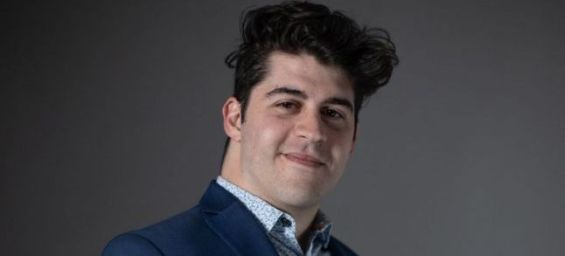When Mehdi Bennani first set foot in the United States, he wanted to become an architect. Freshly graduating from Casablanca’s French high school, Lycée Lyautey, he joined his brother in Los Angeles as a cost-effective measure for their parents who valued American education.
Once in LA, in 2011, Mehdi decided to enroll in a foundation program, going to the same institution as his brother, the Santa Monica College. At the California public community college, he took a preparatory program to later get into architecture.
Later, the Casablanca-native joined the University of Southern California (USC), where his love for the film industry would start. Mehdi majored in architecture, honoring the promise he had made before leaving his home country Morocco.
«USC had a very good architecture school. I was able to transfer to that school, where I did two years of studio work, during which you draw and work on computer programs related to architecture», the LA-based Moroccan told Yabiladi over the phone.
Contrary to his own expectations, he did not like the major as much as he anticipated. Mehdi wanted to be more creative and, during his two first years in architecture school, he realized it was not the path he wanted to follow.
From architecture to production design
What really spoke to the young student was film. Production design especially, a fusion of art, architecture, and narrative, expressed through space, lines, shapes, colors, and patterns, to create a powerful visual language for enriching on-screen stories. One of the pillars of the film industry, in addition to cinematography, scriptwriting and directing.
Mehdi switched his architecture five-year program to a four-year one, obtaining a bachelor’s in architecture instead of becoming a full-fledged architect. «This degree will allow me to become a professor in architecture but not an architect. For me to become an architect I needed to finish the five-year program which I did not want to do», he explained.

What Mehdi wanted really to do was to know more about this new field, production design. «I did not even know it existed, I had no idea it was a profession or a career», Mehdi recalled. «There was only one class at USC that offered production design. I have always been passionate about film, and it was basically like finding something that connected both my passion for film and the skills that I had learned in architecture school», he proudly remembered.
Right after completing his architecture bachelor, Mehdi started looking for jobs in production design. To learn more about the field and gain experience, he started taking small gigs, such as working as production assistant on a music video.
Later, Mehdi was given the role of a production designer for a student film. He was expected to design a set and understand how the director wanted the different shooting locations to look like. «I did not have any experience and they just gave me the job. But honestly, it really made me want to learn more and become better. I had such a good time, and I was so happy doing that job and I knew exactly that this was the right path for me», he recalled.

After working in the sets of different short movies and student films, Mehdi decided to start a degree in production design. He applied for the American Film Institute and went on to pursue a master’s degree in production design.
«The first year was during Covid, everything was online. I learned more about production design as a career, what to do and how to do it, drawing and making plans», Mehdi explained. During his studies, architecture knowledge came in handy. «All of the things that I have learned in architecture came back to help me. All the skills that I had learned. It was nice to be able to put everything together and follow this career path», he said.
Building sets in Hollywood
In 2022, Mehdi graduated and started working on different projects as both a production designer and an art director.
«The production designer is the head of the art department, which is in charge of everything that you see around the actors, everything that they touch. For example, if you are filming in a house, everything that you see inside of that house is from the art department», Mehdi enthusiastically explained.
Gladiator, for example, Mehdi’s favorite movie, is an excellent example of what an art department, under the guidance of a production designer can do. «They had to create all of the background from scratch to show that we are in Rome, during the Roman Empire, we are in a coliseum. The Coliseum is very old and not fully restored, so you must have the art department recreate and build a set that looks like it», he added.

As for the art director, they are second in command in an art department. «The production designer gives references and images or sketches of things that the art department can do», the art director is then in charge of communicating it to the rest of the art department team.
Mehdi worked as a production designer for a short movie titled «In Wonderland». The movie, which was also his thesis project, tells the story of a Mexican eight-year-old little girl who crossed the border to the USA. Once in America her dad died, and she became stuck in the country.
The movie was screened in several local festivals and won prizes. «It’s a nice heart-felt story about emigration through the eyes of a little girl. During the Trump presidency there were a lot of kids who were separated from their parents while they were applying for asylum and that is something that pushed us to show this story and how difficult it is for a child to go through emigration», the young man explained.
In addition to short movies, Mehdi worked on several commercials, art directing and set dressing. One of them required transforming an Irish bar into an Australian one, while shooting in LA.
Better representing Morocco
Currently, Mehdi is working on another short movie. The film is set in a small-town mosque, that he must help design and set up from scratch. «We are thinking about renting a community center and turn it into a small-town mosque with all the decorations you can find in a mosque», he explained.
Through his job as a production designer and art director, Mehdi is trying to help better represent Moroccans, Arabs and Muslims in Hollywood. Designing and building sets for movies and films can help break stereotypes on these communities and help people from different backgrounds feel represented, Mehdi believes.

«It is something that I have been fighting against in all of the projects that I have been working on», Mehdi argued. «Now it is very important that all cultures be shown the way they truly are, not just for the movies. People want to see themselves in the movies and feel represented», the young professional regretted.
«It is important to show the human aspect of people all around the world», said Mehdi who hopes to work on bigger projects and make a difference in his field.





 chargement...
chargement...












